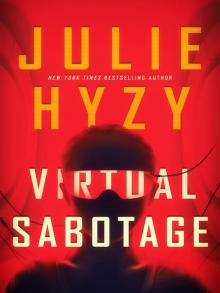- Home
- Julie Hyzy
Affairs of Steak Page 3
Affairs of Steak Read online
Page 3
“What are you doing?” Sargeant practically shrieked.
“We should feel for a pulse.”
“Oh my. Oh my.” Wringing his hands and looking ready to faint, Sargeant started for the door.
“Use your cell phone,” I said. “Don’t leave the room.”
“But the security guard…”
“Just use your cell,” I said, focusing on Patty. I reached in to press two fingers to her neck. She was still warm. “What if whoever did this is still here?”
Sargeant took a step closer to me, dragging a cell phone from his pocket. When the dispatcher answered, the sensitivity director had regained his composure. “We need the police,” he said, and provided the address. “There’s been a…” Faltering, he stared at me. “…an accident?”
I pressed my fingers against several places in Patty’s neck, searching for any trace of a pulse. When Sargeant looked at me, I shook my head. “Have them send an ambulance anyway. You never know.”
He repeated the request into his handset. “We’re on the second floor in the kitchen. And,” he added, “we’re with the White House. Make it fast.”
I stepped away from Patty’s body, trying to force myself to think. By touching the tilt-skillet’s handle, even with my sleeve, I might have smudged a fingerprint. I hoped to God I hadn’t.
Sargeant’s little eyes were as wide as I’d ever seen them. “Shouldn’t we alert the guard?”
I was torn. What if the guilty party was still nearby? What if leaving this scene unattended was the wrong thing to do? What if staying was the wrong thing? I couldn’t focus. One thing I did know: Of all the choices spinning through my head right now, splitting up seemed the worst idea of all. I turned to look at the swinging doors with the porthole windows. Sargeant followed my gaze. The corridor beyond was dark again. “At least that means there hasn’t been any movement out there,” I said.
“Not yet.”
It dawned on me that the security guard might have the capability of sealing off the building. “On second thought, let’s go. We’ll do this together.”
With Sargeant behind me, I summoned the nerve to push through the porthole doors again. We had no idea what we were walking into, but this had to be done. I tamped down the raging fear that pounded in my heart like a jackhammer. Praying I wasn’t stepping into a trap, I took a long stride forward, readying myself for the lights to come on and brighten our path.
Nothing.
“Why aren’t they working?” Sargeant asked. Close enough for me to feel his hot breath on my neck, he was a whole lot deeper into my personal space than I’d ever expect Sargeant to be. Or me to allow.
I reached behind to grab a handful of his trench coat sleeve. “Let’s move,” I said, “fast, okay?”
There was enough ambient light from the portholes to see our way clear to where we needed to take a left, but from there on the darkness was pitch. “Don’t they believe in windows around here?” he whispered.
“Not for the working areas,” I said, keeping my voice just as low. “Keep it utilitarian. No frills, no distractions.”
“Shameful,” he said, “worker conditions like this.”
Behind me, I could feel him trembling, and though my legs felt rubbery and weak, we plowed ahead, our inane conversation helping—in a bizarre way—to keep us from freaking out at the thought of Patty’s motionless form in the kitchen behind us.
The wooden door marked PRIVATE on the other side was just ahead. One second before I grabbed the handle and pulled, I prayed it wouldn’t be locked. With a sigh of relief, I dragged it open and Sargeant and I ran for the main staircase, no longer clinging to each other. I wished I’d noticed the security guard’s name. I shouted, “Guard!”
“Guard!” Sargeant’s voice was louder, more shrill.
We spotted her trudging up, looking ready to chastise us for making too much nose. “The police are on their way,” I said breathlessly. “Patty has been…” My mouth moved but no words came out. “…hurt. They’re sending an ambulance and police. Can you lock down the building?”
“Whoa, hold on. Slow down a minute. What are you saying?”
Though short, I pulled myself up to my full height and injected authority into my voice. “Shut the building down,” I said, “now. Only open the door for the cops. Get it?”
She squinted at me and began to argue.
“Just do it, you fool woman,” Sargeant shrieked in a pitch so high I’d only ever heard it before from dolphins. “There’s been a murder upstairs.”
The police and ambulance took only moments to arrive. Whether their nearly instant response had anything to do with Sargeant mentioning our White House connection or if they were always just that prompt, I didn’t know. Cops tumbled in by the dozens, some in uniform, others clad in black, like a SWAT team. Belatedly, I realized they’d expected to encounter a presidential emergency. Expecting big trouble, each one wore a helmet and body armor and carried an enormous automatic weapon in his or her hands. The uniformed officers were ordered to secure the first floor while the SWAT-type guys corralled Sargeant, the guard—whose name was Jorjanna—and me.
“Who called us?”
Within moments, Sargeant and I gave them the basic information they needed to proceed. Jorjanna told them she’d done her best to secure every exit.
Grudgingly, she remained down by the front door as Sargeant and I took the police and paramedics upstairs. The lights were still not working and the officers pulled out flashlights to illuminate the creepy corridors. Two officers led our group, two brought up the rear. Sargeant was too close, yet again. At the porthole doors, I said, “In there.”
The two lead cops peered in before turning around to silently gesture that we and the paramedics should wait. The two cops at the rear jostled forward, holding up when the leader held up three fingers, then two, counting down. Just as he reached “one,” the cops burst through the swinging doors to swarm the kitchen. I watched through the window as they looked up, down, around every corner, into every nook. One by one, they shouted to let us know areas were clear. The young man who had been the leader removed his helmet and wiped sweat from his brow. He stared.
For half a second I panicked that the body was gone, that it had disappeared while we ran for help, like bodies so often do in movies and on TV. But then he shouted, “Bring the paramedics in here.”
They rushed past us, banging through the swinging doors into the room. Sargeant and I followed, tentatively. When the lead cop pointed at Patty’s body, I surreptitiously checked out his name badge. Kooch. “You knew her?” he asked.
Knew. Already using the past tense. Even from here, even before the paramedics turned to us and shook their heads, everyone could tell she was dead.
Sargeant crawled close. I could smell the fear radiating from him. “Her name is Patty Woodruff,” I answered. “We were supposed to meet her here. She’s an assistant to the First Lady at the White House.”
Kooch rubbed his face. “Was.”
I glanced over. What a terrible place to die. “Yeah.”
“Sir,” one of the other team members raised his voice, “over here.”
Kooch gripped his gun and shifted to where the other cop pointed. The second tilt-skillet. After finding Patty,
I hadn’t thought to check the other one. Maybe because
I hadn’t wanted to. Muffled noises came from inside the stainless steel box. A voice. Female. We hadn’t heard any noises before. We certainly would have noticed. I exchanged a look with Sargeant, who was as pale and still as a frozen turkey. Though we couldn’t make out the words, the voice moved with an odd cadence, as though we were listening to a television program through the skillet’s metal lid. Three officers surrounded the piece of equipment and gestured for us to back off. We didn’t need to be told twice.
“Police,” Kooch shouted. “Come out if you’re able to. Or knock to let us know you’re trapped.”
The blathering continued for a moment, then mu
sic, then nothing.
“Come out,” he repeated, “or knock.”
Complete silence except for Sargeant’s shallow panting next to me. I took another look at his terrified face. “Maybe you should step outside for some air,” I whispered to him.
He shook his head.
“At least breathe slower, then,” I said. “You’ll hyperventilate.”
“I’m fine.”
Kooch gestured toward the door with his chin, the message in his eyes unmistakable. “Get out of here.”
I couldn’t move. My legs were lead weights, immobile. At least until I knew what—or who—was in that other tilt-skillet, I wasn’t going anywhere. I inched backward a few feet to appease him, nearly toppling over Sargeant as I did so.
With their guns trained on the giant skillet, the police locked eyes and nodded another countdown. At “one” Kooch stepped forward and threw open the lid.
“Oh my God,” Sargeant said, gripping both my arms from behind. A second later he let go as he slid to the floor. “Oh God.”
Jammed inside the second tilt-skillet was Mark Cawley, the White House chief of staff. And from the looks of his blue-tinged skin, he’d been here a lot longer than Patty had.
CHAPTER 3
WE STARED DOWN AT CHIEF OF STAFF CAWLEY for a breathless, silent moment. A diminutive man, shorter even than Sargeant, he was dressed in a dark suit and wore his trademark cherry red tie. Unlike Patty, he didn’t have a huge gash on the back of his head. In fact, except for being tightly crammed into the coffin-like skillet space and his deathly skin color, he looked relaxed, as though he were simply sleeping.
Just as Kooch leaned in to get a better look at the official, the radio voice leapt back to life, this time not so muffled. Everyone in the room jumped. Sargeant yelped. Kooch held up two hands as though to assure us everything was under control, then reached in and pulled up a cell phone. He studied the display, his face unreadable as his finger sought the silencing button. Unable to quiet the device fast enough, we were treated to two repetitions of Cawley’s ringtone. Set to play a recording of a local female DJ talking about the next selection, it was unusual to say the least. You could hear the smile in her velvet voice: “For all you lovers out there celebrating tonight, this one is for you…”
Opening notes from one of Barry Manilow’s hits followed, the song cutting off just before the lyrics began. The ringtone then looped back and repeated the DJ’s sultry announcement and the song’s first few measures. I recognized the classic “Mandy.” An odd choice for a ringtone. We’d recently hosted the White House chief of staff and his wife at the White House. Her name was Susan.
“Who was calling him?” I asked.
Kooch glared. Without even knowing me, he was irritated by my question. “This will go into evidence.” Another officer approached with an open plastic bag. Kooch placed the phone inside. “Cell phones offer lots of clues.”
“Patty!” I said, startling everyone, including myself. “Where’s her cell phone?”
Kooch looked at me as though I’d gone crazy. “If it’s here, we’ll find it. Why don’t you step outside until we’re finished?”
“You don’t understand,” I said, “Patty has a special White House cell. All staff members have them. If someone gets their hands on it…” I let the thought hang.
Kooch nodded and, to his credit, didn’t try to kick us out again. One of his team had already called for backup. While we awaited their arrival, Kooch made a methodical examination of Patty’s resting place. Her purse had been wedged in behind her bent knees.
“I don’t want to disturb the crime scene,” Kooch said, “but in the interest of national security, I will take a look through her purse.”
He poked through her turquoise bag using a black plastic wand, moving sideways to allow me a better view. “You see it in here?”
I didn’t. Taking a critical look at Patty this time, trying to block out the sadness as I did so, I realized she had no pockets in her skirt and wore no outer jacket over her silk blouse. Unless the phone was tucked beneath her body, it was not here. “She must have a coat nearby,” I said. “It’s too cold to have gone out without one.”
Kooch dispatched two of his men to look for it. “The other victim isn’t wearing one, either.”
Good thing. At least from the killer’s perspective. Tilt-skillets are not huge, and fitting a full-grown adult into one couldn’t have been easy. Mark Cawley, though not a large man, was still considerably bulkier than Patty. He barely fit in the tilt-skillet.
“Looks like he was shot,” Kooch said as he examined Cawley. “Back of the head, execution style.” He held both arms out. “Everyone back up. We’ve contaminated this scene enough.” Waving to the EMTs, he said, “Wait for us on the main floor. Secret Service is on the way. I’m certain they’ll want to talk with you.”
Within minutes, more Metro police, a wave of Secret Service, and every authority I could imagine flocked to Lexington Place. Mostly men, they crammed into every available space outside the perimeter Kooch had established. Amid murmured discussions and shouted directives, I understood they were waiting for the scene to be processed. I grasped Sargeant’s arm again, pulling him into a small area as far from the active crime scene as possible.
We shared a corner of the huge kitchen, a nook just big enough for us both to sit in as long as we kept our knees up. Sargeant leaned against a portable refrigeration unit facing me, looking like a well-dressed little boy forced to sit in the corner until he behaved. I leaned against the tile wall facing him. Except for the many law enforcement legs running back and forth between us and the tilt-skillets, we had a direct view of everything.
“Why won’t they let us go?” he asked, “Doesn’t it make more sense to get us out of here?”
“They’ll want to talk to both of us while everything is still fresh in our minds.”
“Fresh in our minds!” His voice grew loud enough to catch the attention of the officers nearest us. Sargeant pretended not to see them, continuing in a whisper, “Do they really believe I’d be able to forget a moment of this tragedy? I’m not like you. I don’t stumble across things like this on a daily basis. I will be as accurate a witness tomorrow as I am right now. In fact, I would prefer to go home for the day. I’ve had quite enough.”
He began to rise, but I stopped him with a look. “Peter, they’re going to want you to walk them, step by step, through every move we made in here. They need to figure out where we left fingerprints, hair, DNA. They need to see everything through your eyes. Just be patient. They’ll come for us soon.”
“Easy for you to say. You’re the expert on criminals and their behavior.”
“Gee, thanks, Peter.” Little did he know that for all my calm talk I was shaking in my shoes. Sure, I’d been involved with violence and crime before, but I’d never gotten used to it. I certainly never expected to come across dead bodies stuffed into kitchen equipment.
“You think they were murdered?” he asked, stealing a glance to his right.
“They didn’t climb in there by themselves.”
He shuddered.
I texted my second-in-command, Bucky, with a cryptic message that said I’d been delayed and didn’t know when I’d be back. I suggested he handle the rest of the day himself.
Less than a minute after sending, my little phone registered an incoming text from Bucky. Uh-oh. What happened now?
After many hours of fielding questions, repeating answers, and clarifying those answers with more people than I usually talk to in a week, Sargeant and I were finally released. I hesitated at the front doors. “Hang on a minute,” I said, backing up. “Look out there.”
Beyond the yellow crime scene tape that quivered in the breeze, dozens of reporters waited outside, eyes bright, microphones ready, itching to snap up juicy details.
“I don’t want to go out there,” I said.
Sargeant sniffed. “I thought you liked being the center of attention.”
&nb
sp; I shot him a withering look.
Jorjanna sidled up. “I can’t leave. They need me to stick around until the building’s representatives get here.” She looked at her watch with disgust. “Where are they, anyway? New Zealand?” Pointing toward a side door, she said, “Nobody is camped out on that side. I’ll call you two a cab.”
Total relief. “Thanks, Jorjanna,” I said. “I owe ya.”
Ten minutes later, Sargeant and I were safely ensconced in the back seat of a taxi.
“Where we headed?” the driver asked.
Sargeant started to say, “The White—”
I interrupted. “The W Hotel. Fifteenth street side.”
Sargeant looked at me like I’d grown a second nose. I ignored him. The W was practically next door to the White House. With all the activity out front here at the Lexington, and once the full story broke, our taxi driver might try to make some quick cash by reporting our White House drop-off. Let him think we were tourists. Weak, but better than the alternative.
“You don’t owe her anything, you know,” Sargeant said the moment the driver took off.
“Huh?”
“You told that security guard that you owed her. For calling us a cab? I think she owed us that much at least. Now that you said it, she’ll try to cash in. Mark my words.”
I waved away his concerns and stared out the window. I had too much to think about right now to deal with Sargeant’s paranoia. I was sure it was just his nervousness talking, but the man had been downright mean to me since the day he started. I didn’t feel like cutting him any slack.
Instead, I focused on everything that had just happened. I tried to force myself to relax on the short cab ride, but it didn’t work. Did one person kill both Mark Cawley and Patty? I was no expert, but it looked to me as though some time had elapsed between the two deaths. Patty had been killed shortly before we arrived. I suppressed a shudder, thinking about her lifeless form. How long had Cawley been there? Hours? Days? He hadn’t been reported missing that I knew of.

 Made for Murder
Made for Murder Grace Among Thieves
Grace Among Thieves Deadly Interest
Deadly Interest Deadly Blessings
Deadly Blessings All the President’s Menus
All the President’s Menus State of the Onion
State of the Onion Grace Sees Red
Grace Sees Red Whitehouse Chef 04 - Grace Under Pressure
Whitehouse Chef 04 - Grace Under Pressure Hail to the Chef
Hail to the Chef Grace Takes Off
Grace Takes Off Grace Against the Clock (A Manor House Mystery)
Grace Against the Clock (A Manor House Mystery) Grace Cries Uncle
Grace Cries Uncle Artistic License
Artistic License Eggsecutive Orders
Eggsecutive Orders Grace Interrupted
Grace Interrupted Affairs of Steak
Affairs of Steak Fonduing Fathers
Fonduing Fathers Foreign Éclairs
Foreign Éclairs Virtual Sabotage
Virtual Sabotage Grace to the Finish
Grace to the Finish